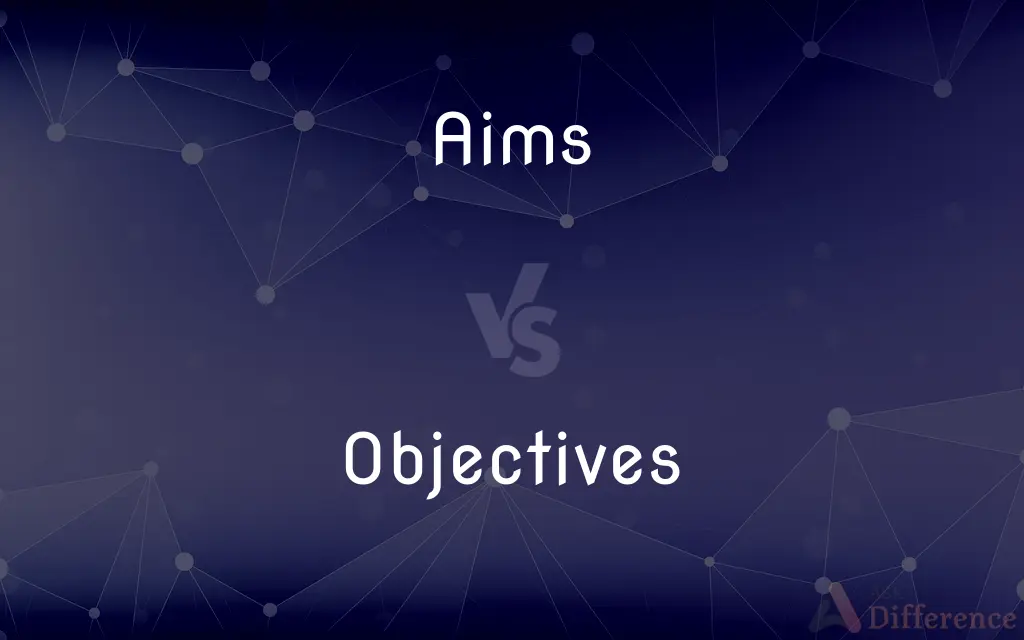Aims vs. Objectives — What's the Difference?
By Tayyaba Rehman — Published on November 7, 2023
Aims are broad goals; objectives are specific, measurable steps. Aims refer to the general end goals that you want to achieve, they are broad and long-term. Objectives are concrete attainments that can be achieved by following a certain number of steps.

Difference Between Aims and Objectives
Table of Contents
ADVERTISEMENT
Key Differences
Aims refer to the general end goals that you want to achieve, they are broad and long-term. Objectives, on the other hand, are concrete attainments that can be achieved by following a certain number of steps. They are often short-term and measurable. Both aims and objectives are essential in project planning, acting as guiding forces for all impending actions.
Aims are often more abstract and open-ended, allowing for flexibility and broad interpretation, whereas objectives are usually precise, practical, and time-bound, leaving little room for ambiguity. While aims fuel the motivation behind a project or plan, objectives offer a roadmap to achieving those aims.
Aims provide the overarching direction for one's efforts, they are the "why" that drives an endeavor. Objectives, in contrast, represent the "how," outlining specific, tangible methods for reaching one's aims. Both are necessary for successful planning: aims provide the vision, and objectives provide the action plan.
Aims can sometimes be confused with objectives, but they function more as the guiding light or the desired final destination of an endeavor. Objectives are the steps taken or the milestones set in order to reach these destinations. Without clear aims, objectives may lack direction; without objectives, aims may remain unfulfilled.
Aims, being broad, help encapsulate the ultimate purpose behind an endeavor, setting the tone and direction. Objectives, being specific, help in understanding the path, the specific tasks that need to be accomplished to reach the aims. Both are interdependent - objectives lead to the achievement of aims, and aims give significance to objectives.
ADVERTISEMENT
Comparison Chart
Scope
Broad, general intentions
Specific, detailed actions
Time Frame
Long-term
Short-term or for a specific deadline
Measurability
Not directly measurable
Measurable and observable
Function
Set the direction and purpose
Outline the specific steps or tasks
Flexibility
More abstract and open to interpretation
Precise and well-defined
Compare with Definitions
Aims
Long-term aspirations.
The scientist's aim was to discover a sustainable energy source.
Objectives
Specific results that one plans to achieve.
The objective was to reduce production costs by 20%.
Aims
Ambitions or desired outcomes.
Her aim was to become a doctor and serve in underprivileged areas.
Objectives
Measurable outcomes within a time frame.
Her objective is to write and publish her novel within a year.
Aims
Broad, overarching goals.
The aim of the legislation is to provide healthcare for all.
Objectives
Precise tasks in a plan.
The committee set an objective to recruit 100 volunteers.
Aims
Targets for achievements.
His aim was to complete the marathon in under 4 hours.
Objectives
Detailed, short-term targets.
The team's objective was to win the regional championship.
Aims
To direct (a weapon or camera) toward a point.
Objectives
Existing independent of or external to the mind; actual or real
Objective reality.
Aims
To direct or propel (an object, such as a ball) toward a point
Aimed the pass at a wide receiver.
Aimed the shot at the lower right corner of the goal.
Objectives
Based on observable phenomena; empirical
Objective facts.
Aims
To direct toward or intend for a particular goal or group
The publicity campaign was aimed at improving the eating habits of children.
Objectives
Uninfluenced by emotions or personal prejudices
An objective critic.
Aims
To direct a weapon or camera
The sniper aimed carefully.
Objectives
A thing or group of things existing independent of the mind.
Aims
To direct or propel an object toward a point
Aimed for the far goalpost.
Objectives
The objective case.
Aims
To determine a course or direct an effort
Aim for a better education.
Objectives
A noun or pronoun in the objective case.
Aims
To propose to do something; intend
The historical society is aiming to restore the town hall.
Objectives
The primary optical element, such as a lens or mirror, in a microscope, camera, telescope, or other optical instrument, that first receives light rays from the object and forms the image. Also called object glass, objective lens, object lens.
Aims
The act of aiming
Take careful aim.
Objectives
Plural of objective
Aims
The ability to hit a target or intended point
A marksman with extraordinary aim.
Objectives
Concrete steps towards a goal.
Our immediate objective is to secure funding for the project.
Aims
The degree of accuracy of a weapon or of a person aiming a weapon or propelled object
Your aim was way off on that throw.
Aims
A purpose or intention toward which one's efforts are directed
My aim was to try to make him laugh.
Aims
Plural of aim
Aims
Ultimate purposes in a plan.
The company's main aim is to achieve complete customer satisfaction.
Common Curiosities
Can aims be somewhat vague compared to objectives?
Yes, aims are broader and can be less specific, while objectives are clear, measurable actions.
How do aims and objectives complement each other?
Aims set the ultimate goal, while objectives outline the specific steps to reach that goal.
Are aims long-term and objectives short-term?
Generally, yes. Aims address long-term aspirations, while objectives tackle short-term targets.
How do aims relate to mission and vision?
Aims are aligned with the mission and vision, encapsulating broader, strategic intentions.
Is it possible to have multiple objectives serving one aim?
Yes, multiple objectives can outline different pathways or tasks to achieving a single aim.
Should objectives always be measurable?
Yes, objectives should be measurable to track progress and determine success.
Are aims or objectives more crucial for project planning?
Both are essential; aims provide direction, and objectives give specific steps for achievement.
How do aims and objectives influence business strategy?
Aims define the business's vision, while objectives set actionable, measurable targets to advance that vision.
Can objectives change while keeping the same aim?
Yes, objectives can adapt to circumstances, while the overarching aim remains constant.
Do aims or objectives come first in planning?
Aims come first to set the vision, followed by objectives that create the roadmap.
Do objectives need to be time-bound?
Typically, objectives are time-bound, providing a timeframe for completion, unlike more open-ended aims.
Why is it important to differentiate between aims and objectives?
Clarity between aims (the "why") and objectives (the "how") ensures a purposeful, directed approach to tasks.
Can the terms aims and objectives be used interchangeably?
They're related but distinct: aims are broad goals, and objectives are specific steps toward those goals.
How do objectives support accountability?
Objectives, being measurable and specific, allow for clear accountability in achieving targets.
How specific should objectives be?
Objectives should be specific enough to provide clear steps and enable progress measurement.
Share Your Discovery

Previous Comparison
Bank Holiday vs. Public Holiday
Next Comparison
Cyanide vs. IsocyanideAuthor Spotlight
Written by
Tayyaba RehmanTayyaba Rehman is a distinguished writer, currently serving as a primary contributor to askdifference.com. As a researcher in semantics and etymology, Tayyaba's passion for the complexity of languages and their distinctions has found a perfect home on the platform. Tayyaba delves into the intricacies of language, distinguishing between commonly confused words and phrases, thereby providing clarity for readers worldwide.













































